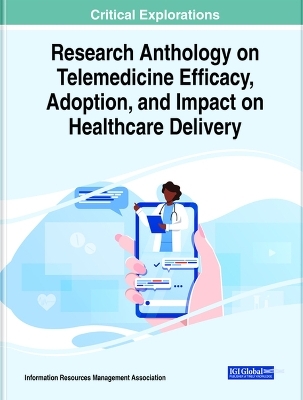
Research Anthology on Telemedicine Efficacy, Adoption, and Impact on Healthcare Delivery
Seiten
2021
Business Science Reference (Verlag)
978-1-7998-8052-3 (ISBN)
Business Science Reference (Verlag)
978-1-7998-8052-3 (ISBN)
Presents research on best practices for adopting telehealth into medical practices and its efficacy and solutions for the improvement of telemedicine, as well as addresses emerging challenges and opportunities, including issues such as securing patient data and providing healthcare accessibility to rural populations.
Telemedicine, which involves electronic communications and software, provides the same clinical services to patients without the requirement of an in-person visit. Essentially, this is considered remote healthcare. Though telemedicine is not a new practice, it has become an increasingly popular form of healthcare delivery due to current events, including the COVID-19 pandemic. Not only are visits being moved onto virtual platforms, but additional materials and correspondence can remain in the digital sphere. Virtual lab results, digital imaging, medical diagnosis, and video consultations are just a few examples that encompass how telemedicine can be used for increased accessibility in healthcare delivery. With telemedicine being used in both the diagnosis and treatment of patients, technology in healthcare can be implemented at almost any phase of the patient experience. As healthcare delivery follows the digital shift, it is important to understand the technologies, benefits and challenges, and overall impacts of the remote healthcare experience. The Research Anthology on Telemedicine Efficacy, Adoption, and Impact on Healthcare Delivery presents the latest research on best practices for adopting telehealth into medical practices and its efficacy and solutions for the improvement of telemedicine, as well as addresses emerging challenges and opportunities, including issues such as securing patient data and providing healthcare accessibility to rural populations. Covering important themes that include doctor-patient relationships, tele-wound monitoring, and telemedicine regulations, this book is essential for healthcare professionals, doctors, medical students, academic and medical libraries, medical technologists, practitioners, stakeholders, researchers, academicians, and students interested in the emerging technological developments and solutions within the field of telemedicine.
Telemedicine, which involves electronic communications and software, provides the same clinical services to patients without the requirement of an in-person visit. Essentially, this is considered remote healthcare. Though telemedicine is not a new practice, it has become an increasingly popular form of healthcare delivery due to current events, including the COVID-19 pandemic. Not only are visits being moved onto virtual platforms, but additional materials and correspondence can remain in the digital sphere. Virtual lab results, digital imaging, medical diagnosis, and video consultations are just a few examples that encompass how telemedicine can be used for increased accessibility in healthcare delivery. With telemedicine being used in both the diagnosis and treatment of patients, technology in healthcare can be implemented at almost any phase of the patient experience. As healthcare delivery follows the digital shift, it is important to understand the technologies, benefits and challenges, and overall impacts of the remote healthcare experience. The Research Anthology on Telemedicine Efficacy, Adoption, and Impact on Healthcare Delivery presents the latest research on best practices for adopting telehealth into medical practices and its efficacy and solutions for the improvement of telemedicine, as well as addresses emerging challenges and opportunities, including issues such as securing patient data and providing healthcare accessibility to rural populations. Covering important themes that include doctor-patient relationships, tele-wound monitoring, and telemedicine regulations, this book is essential for healthcare professionals, doctors, medical students, academic and medical libraries, medical technologists, practitioners, stakeholders, researchers, academicians, and students interested in the emerging technological developments and solutions within the field of telemedicine.
Information Resources Management Association (IRMA) is a research-based professional organization dedicated to advancing the concepts and practices of information resources management in modern organizations. IRMA's primary purpose is to promote the understanding, development and practice of managing information resources as key enterprise assets among IRM/IT professionals. IRMA brings together researchers, practitioners, academicians, and policy makers in information technology management from over 50 countries.
| Erscheinungsdatum | 23.03.2021 |
|---|---|
| Sprache | englisch |
| Maße | 216 x 279 mm |
| Themenwelt | Medizin / Pharmazie ► Allgemeines / Lexika |
| Medizin / Pharmazie ► Gesundheitswesen | |
| Medizin / Pharmazie ► Medizinische Fachgebiete ► Medizinethik | |
| ISBN-10 | 1-7998-8052-4 / 1799880524 |
| ISBN-13 | 978-1-7998-8052-3 / 9781799880523 |
| Zustand | Neuware |
| Haben Sie eine Frage zum Produkt? |
Mehr entdecken
aus dem Bereich
aus dem Bereich
Grundlagen, Arzneimittelporträts, Anwendung
Buch | Hardcover (2024)
Urban & Fischer in Elsevier (Verlag)
CHF 95,90
Buch | Softcover (2022)
MWV Medizinisch Wissenschaftliche Verlagsgesellschaft
CHF 55,90


